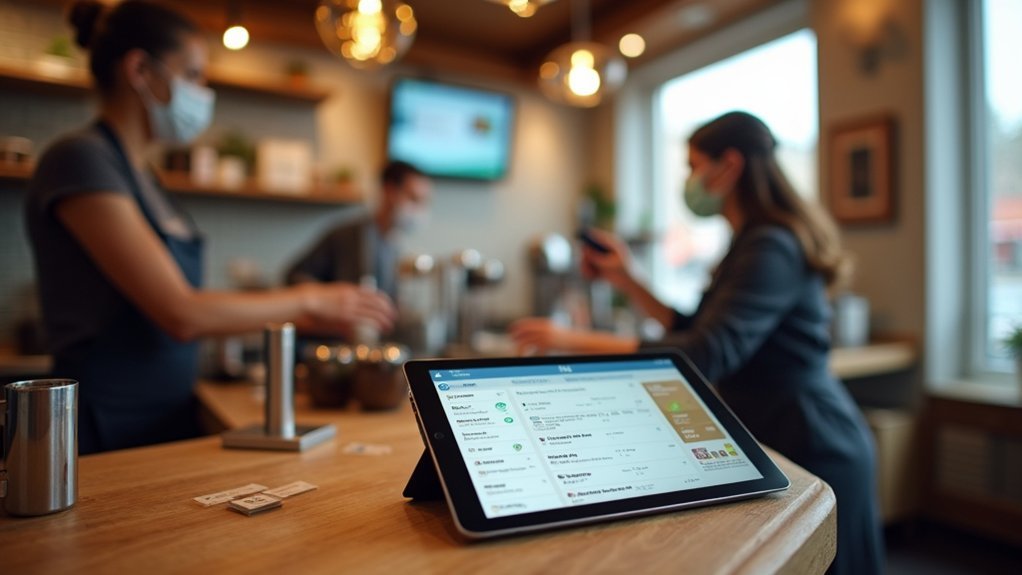During the pandemic, over 70% of small businesses faced potential closure, forcing entrepreneurs to reimagine their survival strategies. You’ll find that successful adaptation isn’t just about surviving—it’s about transforming challenges into opportunities. When traditional business models crumble, innovative companies discover creative pathways forward. PhoMPH Restaurant’s remarkable digital pivot demonstrates how strategic technological integration can turn crisis into competitive advantage. Want to understand how businesses can not just endure, but potentially thrive during unprecedented disruption?
Key Takeaways
- Digital transformation enabled PhoMPH Restaurant to rapidly adapt, increasing online orders from 92 to 601 within one month during the pandemic.
- Strategic partnerships with online ordering platforms like Your Fare and Pronto created new revenue streams and enhanced customer engagement.
- Technological innovation served as a critical survival strategy, allowing businesses to reimagine operational models and maintain competitive edges.
- Flexible digital adaptation led to significant financial recovery, with PhoMPH experiencing a remarkable 600% gross profit increase through online channels.
- Successful business pivots during COVID-19 required swift, targeted technological integrations that prioritized customer needs and operational efficiency.
Understanding Business Pivots in Crisis

While the COVID-19 pandemic disrupted global business landscapes, understanding business pivots became essential for organizational survival. A business pivot represents a strategic response to unprecedented challenges, requiring companies to rapidly reassess and redesign their operational models. You’ll need to recognize that successful pivots aren’t about complete overhauls, but targeted adaptations that address emerging market dynamics.
Digital transformation emerged as a critical pathway, with businesses leveraging technology to maintain competitive edges. By analyzing consumer behavior shifts and technological opportunities, you can identify potential pivot strategies. The pandemic demonstrated that companies embracing innovative approaches—like enhancing e-commerce platforms or introducing contactless services—could not only survive but potentially reveal new revenue streams and long-term sustainability.
Agility and strategic thinking become your most valuable assets during crisis-driven business transformations.
PhoMPH Restaurant: A Strategic Transformation

The COVID-19 pandemic forced businesses like PhoMPH restaurant to rapidly reimagine their operational strategies, transforming challenges into opportunities for growth. By integrating innovative online ordering platforms, they strategically addressed customer needs during unprecedented disruption.
| Technology | Impact | Outcome |
|---|---|---|
| Your Fare | Order Management | 601 Online Orders |
| Pronto | Customer Engagement | 40% Order Share |
| Digital Integration | Operational Efficiency | 600% Profit Increase |
Their decisive technological pivot demonstrated remarkable adaptability. The restaurant’s approach showcased how precise technological implementation could convert potential pandemic-induced losses into significant gains. By centralizing online ordering systems and expanding visibility across multiple delivery applications, PhoMPH transformed a crisis into a strategic growth opportunity. Their successful transformation not only sustained business operations but positioned them for future expansion, evidenced by plans to open a second location in Austin.
Technological Innovations and Online Ordering

As restaurants navigated the pandemic’s complex landscape, technological innovations in online ordering emerged as a critical survival strategy. PhoMPH’s partnership with Your Fare and Pronto demonstrated how strategic digital integration could transform business operations. By consolidating online orders into a single platform, they dramatically increased order efficiency and visibility. The results were remarkable: online orders skyrocketed from 92 to 601 in just one month, with over 40% of June’s orders originating from the new system. This technological pivot wasn’t just about survival; it was a calculated response to changing market dynamics. The user-friendly backend management and multi-platform approach allowed PhoMPH to not only adapt but thrive, turning technological innovation into a powerful competitive advantage during unprecedented challenges.
Navigating Pandemic-Induced Market Challenges

Amid unprecedented global disruption, businesses confronted rapidly evolving market challenges that demanded immediate strategic recalibration during the COVID-19 pandemic. You needed to pivot swiftly, transforming traditional operations into digitally adaptive models that could withstand unprecedented economic pressures. Companies like PhoMPH demonstrated successful transformation by integrating technology for online order management, enabling them to increase gross profits dramatically.
Your strategic approach required embracing digital platforms, reimagining distribution channels, and developing innovative customer engagement methods. By leveraging e-commerce capabilities and contactless services, businesses could navigate market uncertainties effectively. The pandemic accelerated digital transformation, compelling organizations to restructure rapidly and create resilient business models that could thrive amid complexity.
Those who adapted quickly positioned themselves for long-term success in a dynamically changing marketplace.
Financial Recovery Through Digital Adaptation

When confronting pandemic-induced economic challenges, businesses discovered digital adaptation as a critical lifeline for financial recovery. PhoMPH exemplified this strategy by integrating Your Fare and Pronto systems, which transformed their online ordering capabilities. By implementing a streamlined digital platform, they increased online orders from 92 to 601 in just one month, demonstrating the power of technological innovation.
Their strategic approach leveraged multiple third-party delivery platforms, expanding customer access and visibility. The Pronto system alone generated over 40% of June’s online orders, directly contributing to a remarkable 600% gross profit increase. This digital adaptation not only stabilized the business during uncertain times but also positioned PhoMPH for future growth, including plans for expansion into new markets like Austin.
Key Strategies for Successful Business Pivoting
The rapid digital transformation experienced by PhoMPH underscores broader strategic imperatives for businesses maneuvering pandemic-driven market disruptions. When pivoting, you’ll need to prioritize technological integration, customer feedback, and agile distribution channels. Your success hinges on understanding market dynamics and swiftly adapting your business model.
| Strategy | Key Action | Potential Outcome |
|---|---|---|
| E-commerce | Online Platform Enhancement | Increased Digital Revenue |
| Distribution | Contactless Delivery Options | Customer Safety & Engagement |
| Technology | Streamlined Digital Systems | Operational Efficiency |
Future Growth and Expansion Opportunities
Because strategic adaptability defines post-pandemic business resilience, entrepreneurs must proactively identify and leverage emerging growth opportunities. Your future growth depends on innovative pivots and technology-driven strategies. By examining successful case studies like Glenlore Trails and PhoMPH, you’ll recognize that transformative approaches can reveal unexpected revenue streams.
Data-driven decision-making becomes essential in maneuvering uncertain markets. You’ll want to invest in technological solutions that enhance operational capabilities and customer engagement. Whether expanding digital ordering systems or creating immersive experiences, your ability to quickly adapt will determine competitive advantage.
The most successful businesses won’t just survive disruptions—they’ll transform challenges into strategic opportunities for sustainable expansion. Your willingness to reimagine traditional business models will be the key to thriving in an evolving economic landscape.
Frequently Asked Questions
How Have Businesses Changed Due to COVID-19?
You’ve witnessed digital transformation accelerate as businesses rapidly adapted, embracing online platforms, contactless technologies, and data-driven strategies to survive. They’re now prioritizing customer engagement through innovative digital solutions that enhance convenience and resilience.
Which Business Suffered Most in the Pandemic COVID-19?
You’ll find the travel industry suffered most during COVID-19, facing unprecedented revenue losses and massive job cuts. Its global ecosystem of airlines, hotels, and tourism services experienced a devastating $1.3 trillion economic collapse in 2020.
What Is the Effect of COVID-19 on an Entrepreneur?
When the chips were down, you faced unprecedented challenges. COVID-19 tested your entrepreneurial resilience, forcing you to adapt digitally, reimagine business models, and pivot strategically—transforming obstacles into opportunities through innovative thinking and technological adaptation.
What Is the Impact of the COVID-19 Pandemic?
You’ll discover the pandemic reshaped global economies, challenging businesses to adapt swiftly. By embracing digital transformation and innovative strategies, you’ll build pandemic resilience, turning disruption into an opportunity for strategic growth and competitive reinvention.
Conclusion
In the digital restaurant landscape, PhoMPH’s journey symbolizes resilience—a phoenix rising from pandemic challenges. You’ll see how strategic adaptation isn’t just survival, but transformation. By embracing technological innovations, you can turn disruption into opportunity, converting challenges into catalysts for growth. The restaurant’s 600% profit surge isn’t just a number; it’s a proof of agile thinking and digital courage in uncertain times.



